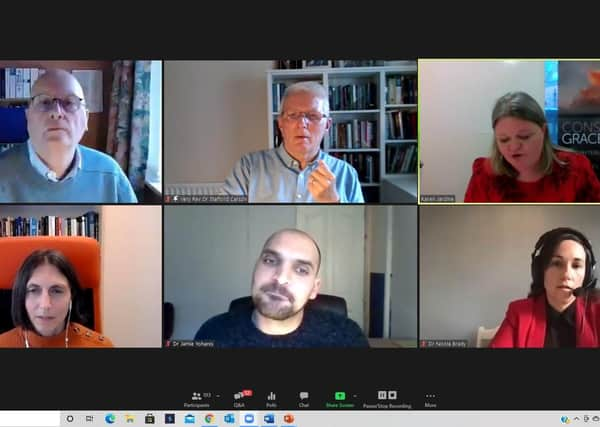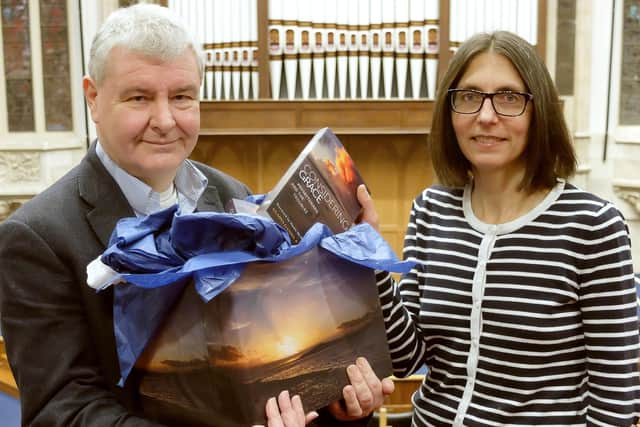Conference hears Christians especially must bring healing and reconciliation to the legacy of Troubles


Delegates from Northern Ireland, the Republic, the US and across the UK took part in the conference yesterday, which was organised in the wake of the groundbreaking book, ‘Considering Grace - Presbyterians and the Troubles’.
Some 125 people from a range of denominations took part in an online question and answer session, which was open to the public.
Advertisement
Hide AdAdvertisement
Hide AdPresbyterian Moderator Rt Rev Dr David Bruce welcomed that the conference, entitled ‘Considering Grace – unpacking the impact’, was able to take place.


“While there remains little consensus around how the state and its institutions should deal with the legacy of our collective past politically, legacy is more than politics,” he said.
“While it is a sorely contested space, we should not forget that it is primarily about people and their healing, and ultimately forgiveness on a road to reconciliation, something that we all have a part to play in – especially those of us who profess a Christian faith.”
Originally planned as a regular conference in March but postponed due to the pandemic, keynote speakers included Belfast-born Chief of Staff to the Archbishop of Canterbury, Canon David Porter and Rev Prof Stafford Carson, Principal of PCI’s Union Theological College.
Advertisement
Hide AdAdvertisement
Hide AdThose watching online quizzed Dr Gladys Ganiel and Dr Jamie Yohanis, the book’s authors, along with Dr Nicola Brady, General Secretary of the Irish Council of Churches, who contributed to the book.
Canon Porter said: “Nowhere is our citizenship in the Kingdom of God put to the test more than in how Jesus calls us to respond to those who do us harm.
“Those who hate, slander and malign us, who persecute, who kill the body but cannot kill the soul. “In a world where a culture of death and vengeance fuels conflict and suffering in a thousand valleys from the Hindu Kush to the Beqaa Valley, from the Jordan Valley to the Great Lakes of Africa, we are to be those who choose life. Whose impossible burden is to love, forgive and let mercy triumph over judgement.”
Former Presbyterian moderator Stafford Carson said that he believed Considering Grace was a significant contribution to the growing body of literature on The Troubles.
Advertisement
Hide AdAdvertisement
Hide Ad“In particular, by documenting the experience of Presbyterians it begins to fill a significant gap in reflections and testimonies from the Unionist/Protestant perspective. The accumulation of individual stories helps us to appreciate the complexity of the pattern of violence in Northern Ireland, the way in which individuals and families have been affected, and the multi-dimensional nature of the conflict.”
The book will stimulate the church to think about how to respond to the “deep divisions and massive injuries” in NI, he added.
For more details about the conference click here.
A message from the Editor:
Thank you for reading this story on our website. While I have your attention, I also have an important request to make of you.
With the coronavirus lockdown having a major impact on many of our advertisers - and consequently the revenue we receive - we are more reliant than ever on you taking out a digital subscription.
Advertisement
Hide AdAdvertisement
Hide AdSubscribe to newsletter.co.uk and enjoy unlimited access to the best Northern Ireland and UK news and information online and on our app. With a digital subscription, you can read more than 5 articles, see fewer ads, enjoy faster load times, and get access to exclusive newsletters and content. Visit https://www.newsletter.co.uk/subscriptions now to sign up.
Our journalism costs money and we rely on advertising, print and digital revenues to help to support them. By supporting us, we are able to support you in providing trusted, fact-checked content for this website.
Alistair Bushe
Editor